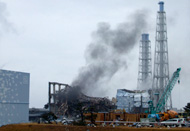The Obama administration has been criticized for its muddled approach to intervening in Libya. But as the experience of Kosovo suggests, an ugly operation is not the same as a failed operation, and even a mission that starts off badly can end well.
The March/April 2011 issue of Foreign Affairs is now online and will be on newsstands March 1st.
A collection of continuing Foreign Affairs coverage of the crisis in Egypt and the Middle East.
North Africa is where the Arab world's recent political upheaval began and where it has reached its most violent climax. Beyond Tunisia and Libya, how nervous should the ruling regimes in Algeria and Morocco be about their political futures?
|
Due to the U.S. experience in Iraq, Americans became skeptical of intervening in overseas conflicts. Much of this "Iraq syndrome" can be seen in the hesitant approach to the chaos in Libya. |
Commentators are falling over themselves to explain the “gender divide” among Obama’s staff. But these discussions reveal far more about gender misconceptions among foreign policy journalists than about the preferences or influence of Obama’s female foreign policy staff. |
For years, Arab dictators used food subsidies -- and cheap bread -- to keep their subjects quiet. But when prices rose, the very thing that regimes used to ensure obedience became a symbol and a source of revolution. |
|
In the debate over whether -- and how -- to intervene in Libya, many commentators and policymakers have relied on a number of garbled lessons from history. Believing in these myths often leads to a more interventionist foreign policy. |
As Japan's ongoing nuclear crisis shows, older reactors are the most vulnerable to failure. Aging nuclear plants pose a risk in the United States as well, and the Nuclear Regulatory Commission must enforce up-to-date safety standards more forcefully -- or risk the possibility of a disaster. |
According to many observers, Syria's Bashar al-Assad was supposed to be immune to the kind of popular protest that swept the country today. Ironically, the basis was Assad’s own public relations strategy. With no real legitimacy, his only resort to stop the protests will be violence. |
Books & Reviews

Two recent books cast doubt on the value of the existing laws of war when it come sto safeguarding civilians in an age of unconventional conflict. But a closer look suggests that the current regulations constitute a firm foundation on which to better protect civilians.
In the Magazine
What does rise of the Tea Party movement mean for U.S. foreign policy? Since today's populists have little interest in creating a liberal world order, U.S. policymakers will have to find some way to satisfy their angry domestic constituencies while also working effectively in the international arena.





